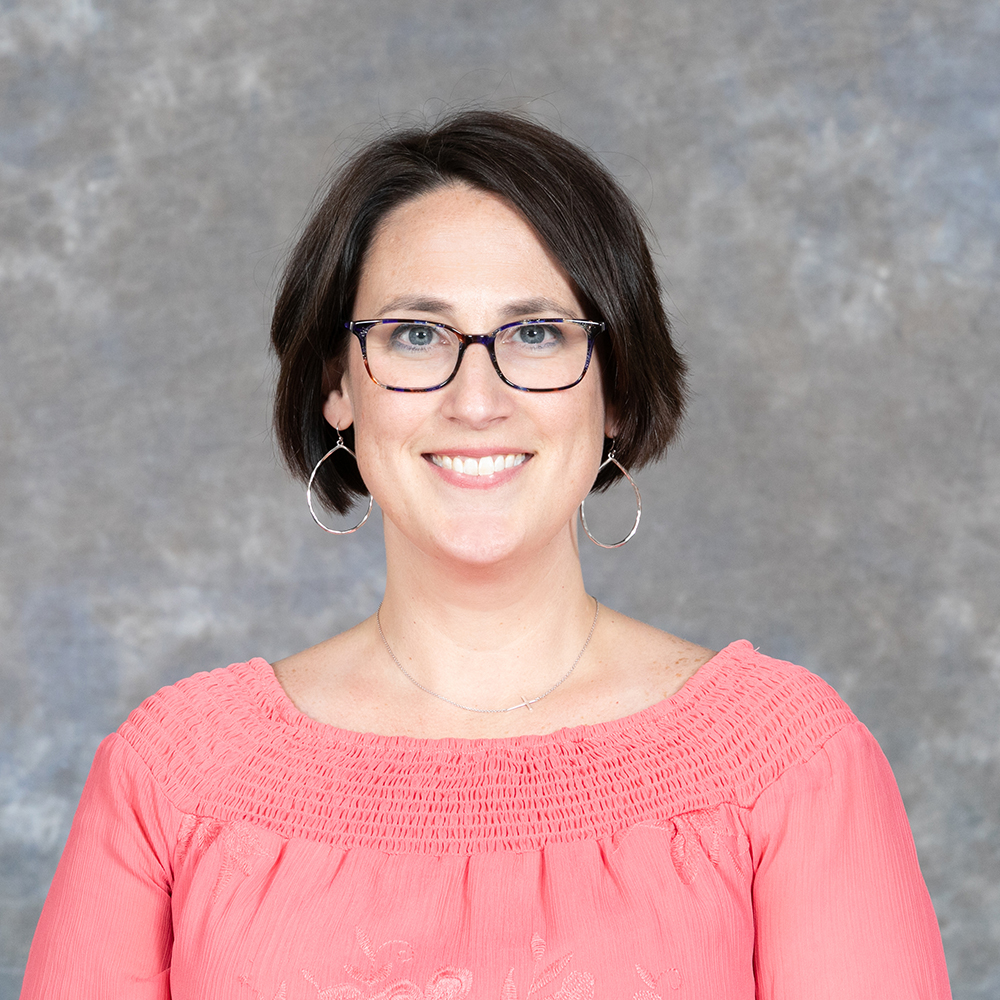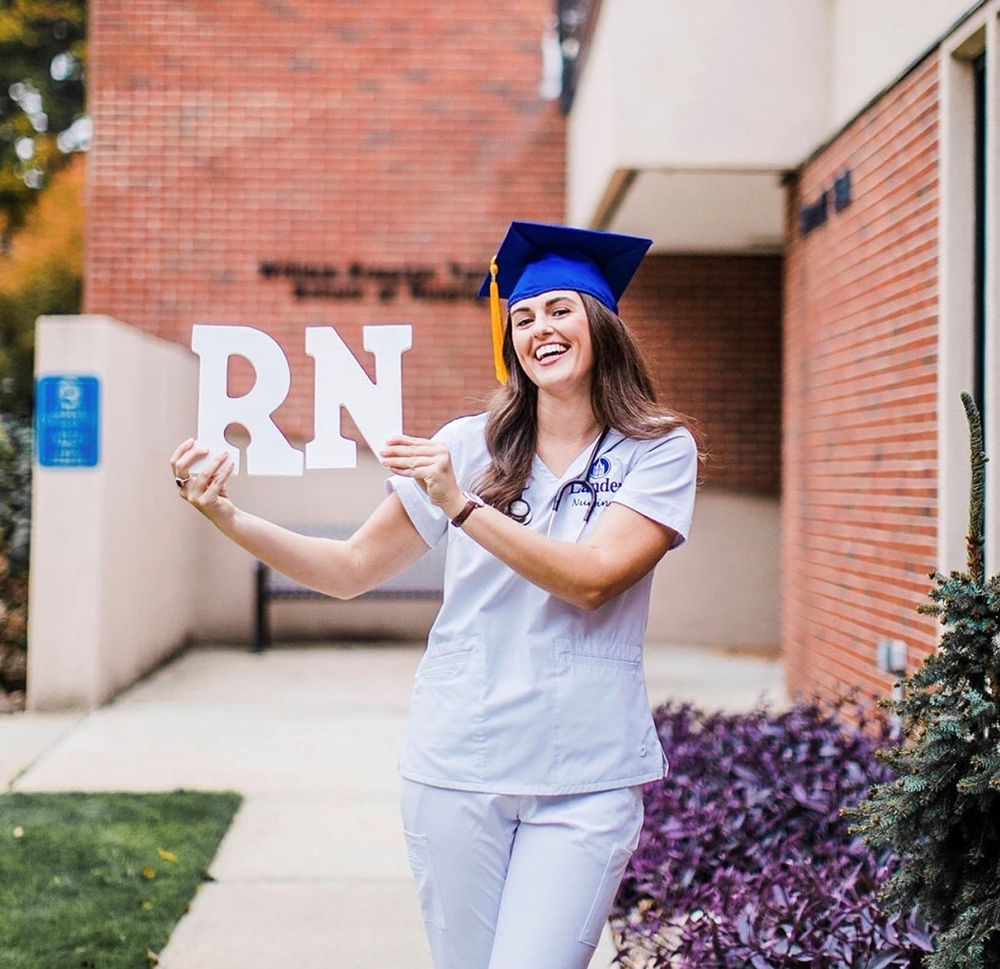
As adults and children stay home to stop the spread of COVID-19, many others are working day and night to take care of those infected by the deadly virus, or treating those with critical medical problems.
Few would accept risking their own health and lives to provide this care, but "running toward the storm" is the mantra of Ashley Lee.
Lee is among the numerous Lander University faculty and alumni working on the front lines of medical care during the pandemic. "No one would run toward a lion, but nurses do," said Lee, a member of Lander's nursing faculty who is imparting courage to her students, the nation's future nurses.
"This is a theme that I share with my students. Yes, it's scary. Yes, people are dying. It takes a really, really brave person to do this job. But I see this bravery in our students and in our alumni. They are amazing," said Lee, who is doing double duty on the front lines as a teacher and a nurse in the Intensive Care Unit at Newberry County Hospital.
Samantha Beauford, a nurse at Self Regional Medical Center in Greenwood, is the embodiment of this selfless spirit. "I am not afraid. I am not scared."
However, as the mother of a one-year-son, Beauford said she always is aware of the need to protect herself and her family. "I know what I have to do to protect myself, but I have my family to think about, too."
Beauford, who earned her nursing degree from Lander in 2015, works on a medical floor where patients have needs ranging from general medicine to geriatric and cancer problems. While no one could have been prepared for the pandemic completely, Beauford said her "leadership-based education" at Lander prepared her to work as part of a team and to support others in her field.
"People in the community are looking to us for answers, too, and part of our job is to educate others," she said. "We're asked how this disease will affect the future and if it will come back. There are so many unknowns, but we do know that there could be other pandemics in the future. What we're doing now will prepare us for those."
Lisa Smith was a nurse for more than 20 years before seeking her master's degree in Lander's Clinical Nurse Leader program. She said her education has enabled her to have more confidence in her job and as a member interdisciplinary healthcare teams united to plan for the medical care that patients will need during the COVID-19 crisis.
A nurse manager for women and children's services at Self Regional, Smith said, "Lander was essential in preparing me for this moment. For the first time in my career, I knew how to do the research that I needed for my job and to present it to hospital leadership so that we could implement changes if needed. I learned how to do this with confidence."
Smith has conducted extensive research on the impact of COVID-19 on pregnant women, who find themselves unable to share the experience of giving birth without their families at the hospital. "This is a difficult time for mothers, especially those who are having their first babies. Some of them would like to have their own mothers with them," she said. "It is our job to reassure them and help them through their concerns about having a baby and having a baby during the time of a pandemic."
Dori Dahlberg understands the concerns of parents. A nurse practitioner in a pediatric office in Greenwood, Dahlberg said parents have questions about children's respiratory symptoms, many of them triggered by spring allergies which coincided with the outbreak of the pandemic. "This time of year, South Carolina has significant environmental allergies that produce cough and often trigger asthma. Patients have become fearful when they get a cough because they do not know if it is related to seasonal allergies or COVID-19."
The office has fewer in-person visits because of social-distancing requirements. Some pediatric patients are seen via telehealth, but others must be seen in person. "All children coming for a sick visit are seen outside at their car by healthcare providers in full PPE (personal protective equipment). All employees and patients have their temperature checked before entering the building. I am now wearing a mask to see well children also," she said.
Paula Haynes finds herself at the other end of the patient spectrum. She is a family nurse practitioner at National Health Care, a long-term care facility for the elderly and those with chronic health problems. "We are very concerned about the pandemic, and we take every precaution we can to protect our patients. We know that they are at great risk because they have significant chronic conditions," she said.
"Every time I send a patient to an appointment at a clinic outside our facility or to the hospital, I worry about their risk for contracting COVID-19," she said. "These patients are very vulnerable to disease."
She said that the stories from the nation's hotspots for COVID-19 "break my heart" as a nurse. "They are very brave. When I see what has happened in New York, I think about the nurses and what they are going through. My daughter is a nurse in Greenwood, and I worry about her, too," she said.
Haynes, who also is a Lander nursing faculty member, said she applauds the students who are enduring the upheaval in their education to complete their classes, especially those who are in their senior year. "They have given up so much, the pinning ceremony which marks their achievements in academia and their commencement ceremony which launches them into their careers."
However, Haynes said, "the mindset of a nurse is to adapt. Our students 'get it.' They've just had to adapt a lot sooner."

Taylor Crawford, who earned her bachelor's degree in nursing from Lander in December 2018, said she has learned to take the stress of the COVID-19 crisis day by day. As a nurse on a medical-surgical floor at Self Regional, Crawford said it is "a time of adapting for everyone … we have learned how to be prepared for patient care, we have learned to adapt to changes in scheduling as we have fewer patients on some of the floors, and we are working as team members with nurses from other floors in the hospital. This pandemic definitely impacts our jobs, but you have to get up and do your job. People need us."
She has been heartened by the outpouring of support from the community. When nurses expressed the need for masks, Crawford said Diane Carver in Greenwood organized a community effort to make masks for the hospital staff. "It is a different time in America. It is an eye opener. One day, our lives will return to what they were before the pandemic, but I think that we will have learned so much from this."
Nursing education will be changed by the pandemic and the nurses who have served on the front lines, Dahlberg said.
"One of the major foundations of nursing education is evidence-based practice, the use of research findings to guide practice. One of the difficulties about responding to COVID-19 is the lack of data and knowledge we have regarding the virus," she said. "Lessons learned from this pandemic will guide the way we respond to future communicable diseases."
"Mostly, I think this pandemic just enforces what nursing education already teaches in regard to hygiene, infection control, immunizations, and public health," she said.
Lee believes nurses will be better prepared to be "in the storm" when patient care requires resilience and resolve. "I tell my students that this crisis is preparing them for the times when you are the nurse in a room and the conditions are wearing on your emotions. Even though you may want to leave the room to collect yourself, you know that you can't."
"You have to stay the course. You can't leave the room," she said. "Being a nurse at the bedside of a patient in the most difficult hours requires extraordinary discipline. It is the duty of the nurse to be there and to stay in the storm."